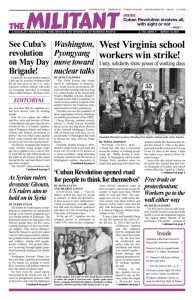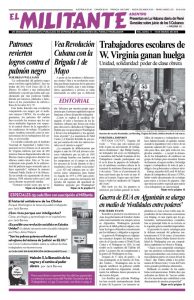“The North Korean side clearly stated its willingness to denuclearize,” South Korean government officials said after meeting with Kim Jong Un, central leader of the Democratic People’s Republic of Korea, March 6. “It made it clear that it would have no reason to keep nuclear weapons if the military threat to the North was eliminated and its security guaranteed.”
The talks increase the possibility of direct negotiations between Washington and the government of the DPRK.
Chung Eui-yong, national security adviser to South Korean President Moon Jae-in, and Suh Hoon, director of the National Intelligence Service, both of whom met with Kim, are expected to fly to Washington this week to discuss the talks with the White House.
President Donald Trump is determined to push North Korea back and avoid war. He seeks to be known as a “peace president,” using draconian economic sanctions and the threat of Washington’s military superiority to do so. He had insisted that Washington would only join talks if the DPRK government agreed they would lead to ending its nuclear weapons program.
“I think they are sincere,” Trump said about the North Korean March 6 offer. He said it was “because of the sanctions and what we’re doing in respect to North Korea.” He thanked “the great help we’ve been given from China.”
At the same time, the U.S. government has no intention of easing its “maximum pressure” campaign against North Korea.
Washington is pushing to get other governments to join in tightening draconian economic sanctions against the people of North Korea. At U.S. urging, the U.N. Security Council approved a new round of sanctions at the end of December.
U.S. sanctions hit workers hardest
Washington has worked hard to get Beijing to join in the sanctions, as China accounts for 90 percent of North Korean trade. And the Chinese rulers have responded, say three Wall Street Journal reporters who recently traveled to Hunchun, China, near the North Korean border. Six months ago “hundreds of vehicles queued up on the Chinese side each morning, bearing food, building materials and consumer goods bound for North Korea, to return later with North Korean exports of seafood, garments and coal,” they wrote. “Not any more.”
“There were more than a dozen garment factories like ours in Rason and thousands of people in the seafood industry,” a Chinese capitalist who had to shut down his garment shop in the North Korean port city told them. “Now, none of those people have jobs.”
U.N. sanctions banning other governments from employing North Korean citizens are also having an impact. Superexploited North Korean workers in Poland, the United Arab Emirates and other countries are filling trains as they return to Pyongyang through China.
Washington and its imperialist allies hope their squeeze and the resulting steep cuts in hard currency, fuel, spare parts and raw material to North Korea will cause severe food shortages.
On Feb. 23 President Trump announced new sanctions targeting 28 ships registered in China and seven other countries, allegedly used by North Korea to transfer coal — North Korea’s main export — and oil on the high seas, evading sanctions.
Decades of U.S. assaults on Korea
Washington is the most powerful nuclear power in the world and is the only government that has ever used nuclear weapons, when it incinerated large parts of Hiroshima and Nagasaki in Japan, during the second imperialist World War.
Washington, the chief victor in that war, occupied south Korea with the collusion of the Stalinist regime in Moscow, dividing the country in two. The U.S. rulers then moved to take over the whole country. During the 1950-53 Korean War, U.S. imperialism carpet-bombed the cities in the North. With the aid of Chinese troops, the North Korean people fought Washington to a draw.
To this day, Washington refuses to sign a formal peace treaty ending the war, which killed more than 4 million people, including 2 million civilians. Washington has 28,500 U.S. troops stationed permanently in the South.
As part of the steps that led to the March 6 meeting, the two Korean governments fielded a joint team in the Winter Olympics and Washington agreed to postpone the annual joint South Korean-U.S. military exercises that had been scheduled during the games. Washington and Seoul say they will mount the provocative maneuvers after the Paralympics, which end March 25.
Chung said Kim Jong Un told the South Korean representatives that “he could understand why” the joint military exercises would resume in April, but expects them to be “readjusted” in the future.
Signaling its wish for an agreement, Pyongyang has not conducted any nuclear tests since Sept. 3 and says it will not do so as long as momentum toward talks proceed.
Thousands cheered the joint South-North Korean women’s hockey team at the Winter Olympics, a reflection of the longstanding desire by many in Korea for reunification of the country. But after more than 70 years of division and the development of two sharply different social systems, reunification can’t simply be proclaimed.
There are only two examples of reunification of similarly divided nations in recent history. Capitalist West Germany absorbed the deformed workers state in East Germany in 1990, after the implosion of the Stalinist regime there, and extended capitalist social relations throughout the reunified country.
North and South Vietnam were reunited in 1975 following a powerful fight for national liberation and wars that lasted nearly three decades. The Vietnamese fighters first defeated the French imperialists and then forced the withdrawal of U.S. military forces in the South, dealing a stunning blow to U.S. imperialism and leading to reunification of the country.
There are no developments of these sorts taking place in Korea today.

